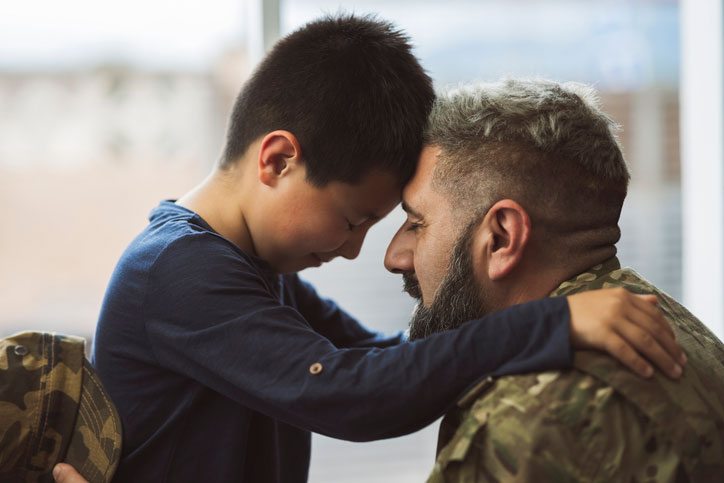
The appearance of U.S. Department of Defense (DoD) visual information does not imply or constitute DoD endorsement.
GI Bill® benefits can cover part or all of the cost of technical school programs, college degrees, on-the-job training, apprenticeships, career-training certificates. They can be applied to online and on-campus programs, part-time or full-time study, undergraduate or graduate degrees, and more.
Veterans and service members aren’t the only ones who benefit from the opportunity to have college tuition paid in full through the GI Bill® – those generous benefits can also be transferred to children and step-children!
According to the IRS, spouses are never considered dependents, but in the eyes of the military they are. In fact, married partners of service members are automatically entitled to dependent status.
But it’s important to note that within the scope of this guide, when referring to dependents, we’re only talking about your kids – including biological, step, adopted, or foster children.
You can find answers to your questions about transferring benefits to your husband or wife in our Complete Guide to College Military Benefits for Spouses.
There are a few other important things you’ll need to know for a clear understanding of exactly how GI Bill® benefits work for your kids.
Can You Can Transfer Post-9/11 GI Bill® Benefits to Dependents? YES
If you’re looking for benefits for your dependents, the Post-9/11 GI Bill® is what should be on your radar. Service members and veterans who served on active duty after September 10, 2001, are eligible for up to 36 months of education benefits through the Post-9/11 GI Bill®.
A service member or veteran’s educational benefits through the Post-9/11 GI Bill® can be transferred to a dependent child.
If your service ended before January 1, 2013, your Post-9/11 GI Bill® benefits will expire 15 years after your last separation date from active service. Otherwise, the Post-9/11 GI Bill® benefits have no expiration date for either you or your kids.
In 2017, President Trump signed the Harry W. Colmery Veterans Educational Assistance Act known as the “Forever GI Bill®.” This bill removed the original 15-year time limit to use the Post-9/11 GI Bill®.
Can You Can Transfer Montgomery GI Bill® Benefits to Dependents? NO
The Montgomery GI Bill® is a special provision that let’s Active Duty (MGIB-AD) and Selected Reserve (MGIB-SR) members kick in $1,200 of their own money at the beginning of service for 12 extra months of tuition reimbursement paid directly to them beyond the 36-months the GI Bill® covers. The Montgomery GI Bill® cannot be transferred to children. It’s important to make that clear up front since this program is a favorite among service members planning for college early.
The Education Benefits Your Children Get Through Post-9/11 GI Bill® Transfers
A service member or veteran can transfer some or all of their Post-9/11 GI Bill® educational benefits to their dependents. As of the 2022 academic year, benefits for the Post-9/11 GI Bill® included:
- 100% tuition and fee payments for in-state public institutions OR up to $26,381.37 per academic year for private or foreign schools
- $1,000 annually for school supplies
- A monthly housing allowance (generally the same as a Basic Housing Allowance for an E-5 with dependents, although other factors such as location of school can influence this allowance). Spouses of service members on active duty do not qualify for the monthly housing allowance but child dependents are eligible.
Benefits are available to service members and veterans who served at least 90 days, with 100% of the benefits paid to those who served for at least 36 months. If the service member or veteran served less than 36 months, benefits through the Post-9/11 GI Bill® are based on the amount of time served in active duty:
- 30-36 months: 90% of the full benefit
- 24-30 months: 80% of the full benefit
- 18-24 months: 70% of the full benefit
- 6-18 months: 60% of the full benefit
- 90 days – 6 months: 50% of the full benefit
Additional Requirements You Need to Meet to Transfer Your Post-9/11 GI Bill® Benefits to Your Children
To meet the basic eligibility requirements for your GI Bill® education benefits, you must meet one of the following requirements:
-
You must have served at least 90 days on active duty since September 11, 2001 (with or without breaks in service)
OR -
You must have received a Purple Heart on or after September 11, 2001, and were honorably discharged (after any amount of service)
OR - You must have served for at least 30 continuous days on or after September 11, 2001 (with or without breaks in service), and were honorably discharged with a service-connected disability
Once you’ve confirmed you’re eligible, there are some additional requirements you and your kids have to meet before you are able to transfer your GI Bill® education benefits…
The good news is your kids may use the benefit while you’re on active duty or after you’ve separated from service. But the catch is that dependent children can only access those benefits until after you’ve finished at least 10 years of service.
Your kids won’t be eligible untill they’ve earned their high school diploma or reached 18 years of age. Unlike spouses, children qualify for the monthly housing allowance even when you’re on active duty. Children also remain eligible even if they marry or you and your spouse divorce.
How to Transfer Your GI Bill® Benefits to Your Dependent Child
 You can transfer some or all of the 36 months of Post-9/11 GI Bill® benefits to your dependent children, provided they are already in the Defense Enrollment Eligibility Reporting System (DEERS).
You can transfer some or all of the 36 months of Post-9/11 GI Bill® benefits to your dependent children, provided they are already in the Defense Enrollment Eligibility Reporting System (DEERS).
You can use the benefits however you see fit. You can split the benefits between you and a child, between one or more children, or between your spouse and children – the choice is yours.
For example, if you’ve already used 24 months of the Post-9/11 GI Bill® for your education, you can then transfer the remaining 12 months to your dependent child. Only one person can use the benefits at any given time.
Your children are not automatically eligible to receive these benefits. Post-9/11 GI Bill® benefits are your benefits and can only be used by your dependents if you transfer your benefits to them.
It’s a two-step process that first requires you to first complete a Transfer of Entitlement (TOE) through milConnect. This will allow you to name the dependent you want to transfer the benefits to and the number of months of benefits you want to transfer. You’ll also use the TOE to change your chosen dependent or revoke the benefits of a dependent.
Note: Once you revoke the benefit from your spouse or child, you cannot reinstate the benefit to the same person.
If you leave active duty, you can also provide a future effective date for when the TOE can be used.
The Department of Defense (DoD) approves the transfer of Post-9/11 GI Bill® benefits. Once the DoD approves the TOE, your dependent may apply to use the benefits by completing an Application for Family Member to Use Transferred Benefits (VA Form 22-1990E), either online or by downloading the form and mailing it to the nearest VA regional office.
Beyond the GI Bill®: Additional Education Benefits for Children of Service Members and Veterans
While the Post-9/11 GI Bill® is an excellent source of funds to help your dependent children pay for some or all of their post-secondary education, it’s not the only educational benefits they may qualify for:
Yellow Ribbon Programs
 If the private, out-of-state, or foreign college or university your dependent child chooses to attend exceeds the benefits offered through the Post-9/11 GI Bill®, they may be eligible for the Yellow Ribbon Program, which covers some or all of the difference in cost.
If the private, out-of-state, or foreign college or university your dependent child chooses to attend exceeds the benefits offered through the Post-9/11 GI Bill®, they may be eligible for the Yellow Ribbon Program, which covers some or all of the difference in cost.
You and your dependent child are eligible for the Yellow Ribbon Program if you’re a veteran meeting one of the following requirements:
- You’ve served at least 36 months on active duty (with or without breaks in service) and were honorably discharged; or
- You received a Purple Heart on or after September 11, 2001, and were honorably discharged after any amount of service; or
- You served at least 30 continuous days on or after September 11, 2001, and were discharged or released from active duty for a service-connected disability
To qualify for the Yellow Ribbon Program, the school your child wants to attend must participate. Most schools cap the amount of tuition coverage they offer through the Yellow Ribbon Program leaving students to pick up the difference, and most also limit the number of students they accept into the program each year.
About a quarter of the 2,000 colleges and universities that participate in the Yellow Ribbon Program fully fund the program and place no caps on enrollments. This elite group of about 500 military friendly schools ensure every eligible student that applies can take advantage of the program and that every single one of them has 100% of their tuition costs covered.
We feature this group of world-class on our regional lists of Top Picks for the Most Military Supportive Colleges in the U.S.
Survivors’ Dependents’ Education Assistance (DEA) Program
Your children may be eligible for benefits through the Survivors’ and Dependents’ Education Assistance (DEA) Program, a program designed for children or spouses of a veteran or service member who meets one of the following criteria:
- Is permanently and totally disabled due to a service-connected disability
- Died while on active duty or as a result of a service-connected disability
- Is missing in action or was captured in the line of duty by a hostile force
- Was forcibly detained or interned in the line of duty by a foreign entity
- Is in the hospital or getting outpatient treatment for a service-connected permanent and total disability and will likely be discharged due to the disability
If you’re a child of a veteran or service member, you can receive benefits if:
- You’re between the ages of 18-26
- You’re married or unmarried
- You’re not on active duty in the military
Recipients of the DEA program receive a monthly payment to help cover the cost of undergraduate or graduate degree programs, career-training certificate courses, educational and career counseling, apprenticeships, and on-the-job training.
As of the 2022 academic year, the monthly DEA payment for full-time students was $1,298 and between $324.50 – $1,026 for part-time students. Learn more about payment rates for the DEA here.
Note: Spouses can receive VA Dependency and Indemnity Compensation (VA DIC) while also receiving benefits through the DEA program. Children cannot receive both benefits at once. The VA DIC program qualifies eligible spouses to receive a monthly benefit payment if the service member died in the line of duty or the surviving veteran died from a service-related injury or illness.
Fry Scholarship
If you’re a child of a service member who died in the line of duty (either while serving on active duty or while not on active duty) after September 10, 2001, or a child of a member of the Selected Reserve who died from a service-connected disability after September 10, 2001, you may qualify for benefits through the Marine Gunnery Sergeant John David Fry Scholarship – better known simply as the Fry Scholarship.
- May be married or unmarried
- May receive a Fry Scholarship until they’re 33 years old if they turned 18 or graduated from high school before January 1, 2013
- May receive the Fry Scholarship upon high school graduation or at the age of 18 (whichever comes first) if they turned 18 or graduated from high school after January 1, 2013
- Can get a Fry Scholarship at any time, no matter how old they are, if their parent was a member of the Selected Reserve and died from a service-connected disability while not on active duty
If the parent died in the line of duty before August 1, 2011, the child may qualify for both the Fry Scholarship and the DEA program; however, only one program can be used at a time.
Children must forfeit DIC payments to start receiving benefits through the Fry Scholarship.
Qualifying children receive up to 36 months of benefits that include tuition, a monthly housing allowance, and an annual stipend. Benefit amounts for the Fry Scholarship mirror the Post-9/11 GI Bill®.





